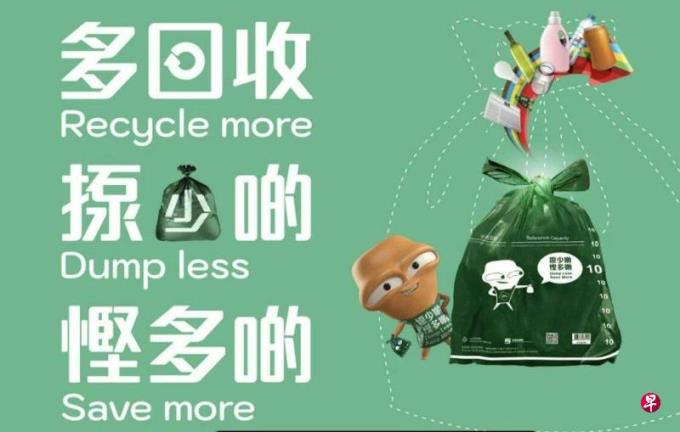
Hong Kong's garbage charging system has been talked about for nearly 20 years. It was originally scheduled to be officially implemented on August 1 this year, but this week has become a hot and spicy political issue, because this policy is now referred to as the original opposition (that is, the Panmin people (that is, the pan -people (that is, the pan -people) It was proposed that the last Hong Kong Special Administrative Region Government was ordered under the high pressure of pan -political and environmental protection.
Some voices immediately pointed out that when the Hong Kong Legislative Council Act passed the waste charging bill in August 2021, the Democratic members had resigned, and the bill was passed under the full vote of the institutional members.Some democratic commentators believe that this reflects that the legislative roughness is separated from public opinion, and garbage charges may become garbage disasters.
Lu Wenduan, vice chairman of the Chinese Overseas Chinese Federation, on Monday (April 8th), published an article entitled to settle on garbage charges to ensure economic development, saying that the Hong Kong government started in 14 places from April 1.In the trial plan, the chaos that appeared reflected that Hong Kong society was not ready. At this stage, it was not suitable to promote garbage charges.
Lu Wenduan suggested that after the trial period, the Hong Kong Government re -considers whether it is behind or completely stop the implementation of garbage charges. The most important thing is to put on hold on the dispute as soon as possible, the dispute consumes social energy, interfere with the government's consequences, and does not meet the hope and requirements of the central government.
He also said: At that time, the radical opposition proposed garbage charges when the pan -politics was seriously flooded. The last government accepted under the oppression of a large environmental hat.
Lu Wenduan's proposal to the Hong Kong Government includes: comprehensively deployed the problem of garbage, gradually implemented in stages; incineration facilities were added, and they were seeking cooperation with mainland cities in the Greater Bay Area to use the remaining production capacity of these urban waste incineration furnaces to deal with Hong Kong garbage.
In fact, Xie Zhanhuan, director of the Hong Kong Environment and Ecological Bureau, had been revealed one day (April 7).Radio Hong Kong quoted him that after the Hong Kong Government had estimated that the Hong Kong clearance was estimated during the epidemic, the economy would rebound quickly, so it was decided to promote garbage charges.Try not only to inspect the actual operation, but also consider cost, profit, participants' feelings and emotions.
Xie Zhanhuan's speech with him in March emphasized that the Hong Kong Government still had great determination to promote garbage charges, and his position obviously retracted.
From this point of view, the Hong Kong government and the establishment camps seem to be putting balloons for giving up garbage charges.There are also comments that the so -called first -first -first -first -first test is the end of the decision to abandon this policy.
The big background of Hong Kong's promotion of garbage charges is that the three piles in Hong Kong are expected to be saturated in the next few years, which is urgent to reduce waste.Under the garbage charging system, Hong Kong citizens must purchase government -designated garbage bags or labels to abandon garbage. The basic principle is to charge it by volume. The higher the cost, the higher the cost.With a 10 -liter or 15 -liter specified garbage bag, the monthly garbage charging expenditure is about 30 Hong Kong dollars to HK $ 50 (S $ 5.15 to $ 8.59).Those who do not abandon garbage in accordance with the law may be fined or even jailed.
As early as 2005, the Second Special Economic Zone Government of Hong Kong has begun to study with garbage charges to promote recycling and reduction. After nearly 20 years of research, consulting, and experiments by the 5th SAR Government, the Legislative Council finally passed the waste in 2018 in August 2021.Draft for disposal (cities) (revised) (revised) draft regulations.The law was initially scheduled to be implemented at the end of 2023. It was later considered that it was considered to be implemented until April 1, 2024 at the end of the year.Since January 2024, the Hong Kong Government has begun to promote garbage charges, but has aroused heated discussion among all sectors of the society, so it is after another until August 1st, but on April 1st, first in 14 shopping malls, stores, restaurants, courtyards and housesGarden first trial.
It has been more than a week since the first trial. Of the 14 pilot places, the courtyard, restaurants and government buildings have been completely switched to designated bags.Unable to hire property management company) The household participation rate is only 20 % to 50 %, which is not ideal.
According to Hong Kong media reports, the appeal of the residents includes that the length of the specified garbage bag is not enough to put it on the trash can. The recycling waste site is insufficient.
Some netizens believe that in order to avoid the payment, some people may throw the garbage into the trash can on the street, and even bring the garbage to the remote place;In the toilet toilet.Some netizens believe that garbage charges can cause citizens to reduce shopping, which may trigger the wave of stores.
Some comments pointed out that the conditions for implementing garbage charges in Hong Kong are actually insufficient, because local per capita residential area is far smaller than other regions. Many houses use open kitchen. Some people live in suite.In any interval, there are insufficient space for many homes, and it is difficult to place different recycling barrels for classification. It is also difficult to stack different types of garbage first, and then take it until it is sufficient and when it is free.
In short, garbage charges affect citizens' pockets and increase the cost of industrial and commercial circles, and it is not constitutional responsibility as legislative as Article 23 of the Basic Law. If the Hong Kong government thinks that this may be a potential political bomb, it is not surprisingEssence
However, Lu Wenduan pointed his finger to the radical opposition, which would inevitably cause controversy.
Professor Huang Huanzhong, Professor of the Department of Biological Department of Hong Kong Baptist University on Tuesday (April 9), said that the garbage charging policy should be neutral and should not be linked to political culture.During the former deputy director of the Hong Kong Environment Bureau, Lu Gongyi, on Monday (April 8), also said in a cable news visit: The most important thing is that we have to do some Fact Check (verify the facts).Hong Kong rsquo; things.She emphasized that the Hong Kong garbage charging policy and blueprint were written with the then environmental bureau director Huang Jinxing and the Environmental Protection Agency.
The new political environment in Hong Kong was originally emphasized to go politically and is committed to developing the people's livelihood economy. Now, the garbage charging system, which is a long -term policy goal, is still politicized by some people.Essence



